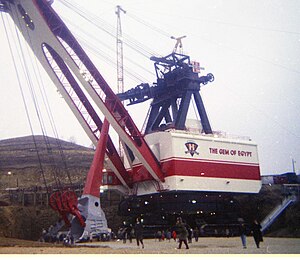 1950-B "GEM of Egypt" 1950-B "GEM of Egypt"
| |
| Class overview | |
|---|---|
| Name | GEM of Egypt (1966-1991) |
| Builders | Bucyrus-Erie |
| Operators | |
| Preceded by | Model 1850-B-series Electric power shovel |
| Cost | US$8 million (1987) |
| In service | 1965-2006 |
| Planned | 2 |
| Completed | 2 |
| Retired | 2 |
| History | |
| United States | |
| Name | GEM of Egypt |
| Builder | Bucyrus-Erie |
| Launched | 1966 |
| Christened | January 1967 |
| Commissioned | January 1967 |
| Fate |
|
| General characteristics | |
| Class and type | Model 1950-B-series Electric power shovel |
| Tonnage | 7,000 t (15,400,000 lb) |
| Length | 70 m (229 ft) |
| Beam | 18 m (59 ft) |
| Height | 67 m (220 ft) |
| Installed power | 1 x 10.1 MW (13,500 hp) electric motors + external power substation |
| Propulsion | 8 x caterpillar tracks |
| Speed | 0.25 mph or 0.4 km/h |
| Capacity | Blade capacity: 130 cubic yards (99.4 m) or 35.1 short tons (31.8 t) |
| Complement | 3-5 |
The GEM of Egypt was a power shovel used for strip mining built by Bucyrus-Erie in 1966 for working the Egypt Valley coalfield near Barnesville, Ohio. GEM is an acronym for “Giant Earth Mover” or “Giant Excavating Machine”. It was one of only two Bucyrus-Erie 1950-B shovels built and one of two to use the knee action crowd licensed from Marion Power Shovel in exchange to Marion's use of BE's cable crowd patent.
In a power shovel
- crowding is pushing the bucket at the end of a "handle" ("dipper" or "dipper stick") in or out to control the depth of cut or to position for dumping
- With knee-action, the handle is connected to a moveable pivot point rather than being supported directly by the boom.
- Knee action design made possible the largest shovel ever built, increased digging power, allowed the bucket to move horizontally into the cut and improved swing efficiency, distance, and radius.
Operational history
The GEM of Egypt had a 170' boom and a 130 cubic yard bucket which enabled it to dig roughly 200 tons per 'bite'. The machine began work in January, 1967 for Hanna Coal, and was later purchased by Consolidated Coal in "Egypt Valley" near Barnesville, Ohio. The area was also where the GEM got its name. The GEM was one of three in the service of the Hanna Coal Company, which by 1970, had been strip mining in Ohio for decades, joined by The Tiger and The Mountaineer.
Of the three, the GEM of Egypt was the largest, and went into service upon the official opening of the Egypt Valley mine in January 1967. It was reported that an estimated 25,000 people traveled to the site, many from Ohio cities such as Cleveland, Akron, and Canton, as well as those from neighboring states. The shovel was 20 stories tall and weighed 7,000 tons. Production there was expected to average 20,000 tons a day, which the company forecast would last for the next 30 to 40 years until the vein ran out.
The GEM was parked in 1988 and finally dismantled in 1991 off Ohio SR9 between New Athens and Fairpoint. Parts of the shovel were used to keep its twin, The Silver Spade, operating until it too was retired.
Gallery
-
 View Inside the Shovel
View Inside the Shovel
-
 The Tiger, which worked alongside the GEM in July, 1974 over I-70 near Morristown, Ohio.
The Tiger, which worked alongside the GEM in July, 1974 over I-70 near Morristown, Ohio.
References
- "Earth Movers: Giant coal shovels continue to fascinate". May 15, 2017.
- ""Giant Shovel on I-70" Ohio Strip Mine Fight: 1973".
- US 3843095
- Berry, Thomas (August 25, 2011). "Increasing the capacity of a stripping shovel". OEM Off-Highway. Ironmarkets. LLC. Retrieved 25 April 2024.
- ^ "The GEM of EGYPT".
- Bucsko, Mike (September 17, 2008). "Largest strip mining shovel in existence, Silver Spade may become park centerpiece". Pittsburgh Post-Gazette. Retrieved 6 January 2012.
- "GEM of Egypt".
| Bucyrus International | |
|---|---|
| Subsidiaries | |
| Products | |
| People | |
| Related | |
This article about mining is a stub. You can help Misplaced Pages by expanding it. |
This Ohio-related article is a stub. You can help Misplaced Pages by expanding it. |